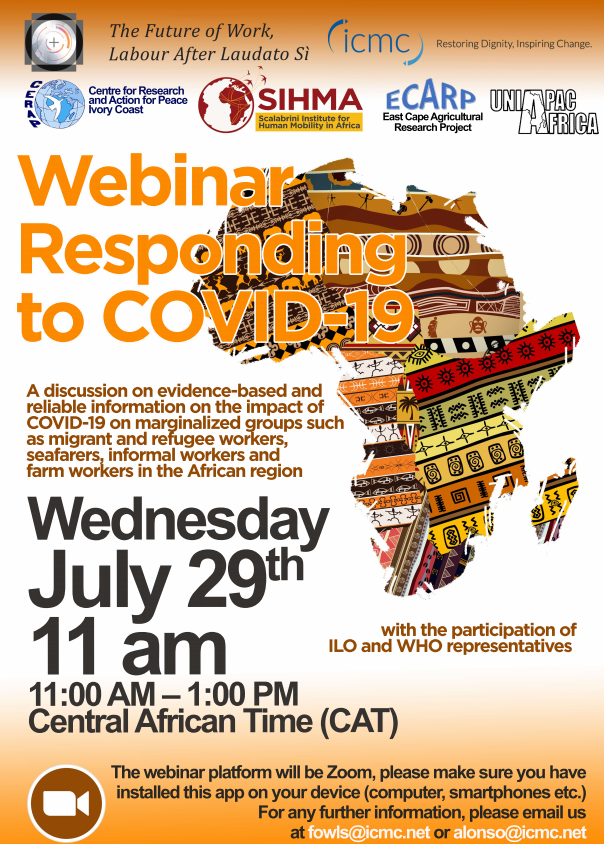
WEBINAR RESPONDING TO COVID-19
On the 29th of July, SIHMA hosted a webinar organized by The Future of Work, Labour after Laudato Si (FOWLS) global initiative and the International Catholic Migration Commission (ICMC) and the Scalabrini Institute for Human Mobility in Africa (SIHMA). The organisers partnered with the East Cape Agricultural Research Project (ECARP), the Centre for Research and Action for Peace (CERAP) and UNIAPAC AFRICA
The webinar was addressed to religious leaders and organizations, NGOs, civil society organizations, and general public to engage their members for worship, charitable and development activities, especially in relation to labour and development in the context of the COVID-19 pandemic.
Among the objectives of this meeting was sharing information on the impact of COVID-19 on marginalized groups such as migrant and refugee workers, seafarers, informal workers and farm workers in the African region. Another goal was exchanging information on the prevention of the virus transmission in the workplace and in informal settings, and responses to those affected by the virus. The webinar also dedicated a particular focus on the role of religious leaders, faith-based organisations, organised labour, and civil society groups, in response to the increased poverty, unemployment, involuntary reduction of work hours, and indecent work conditions in the context of the pandemic.
The event encouraged knowledge and experience exchange on topics such as:
• Responding to the needs of affected individual workers, their families, and local communities, with special attention to populations with particular vulnerabilities (migrants, youth, homeless, among others).
• Protecting/supporting co-workers and their families during the phases of prevention, treatment, recovery, and reintegration into community activities.
• Supporting and sustaining organizations in these difficult times.
Ignacio Alonso Alasino, Project Manager of the “The Future of Work, Labour after Laudato Si” initiative, welcomed the participants on the zoom meeting and made some introductory comments. He mentioned that ‘Pope Francis in his Encyclical Laudato si’ has provided us with a lens and a compass for the care of our common home, including our common human family’ and that ‘the crisis makes us aware that we must rethink and reshape our present model of globalisation considering the poor, the natural environment, and the future generations. The main message of Laudato sí is that our world is a wonderful gift but that we are putting its future under threat by our way of living.’ The webinar was held in English and French with translation provided to participants and the moderator of the event was Fr. Filippo Ferraro, the Director of SIHMA. Fr Filippo’s moderation and facilitation expertly coordinated speakers and questions from participants fluidly oscillating between English and French.
After the welcoming address and comments from Ignacio, there were a series of presentations on interventions during the pandemic. The first intervention was from Mr. Peter Van Rooij, Deputy Regional Director of the International Labour Organization (ILO) Regional Office for Africa. Mr Van Rooij provided successive examples of civil society and faith based responses have been to the pandemic with a particular focus on labour, labour rights and the strategies and action plans of the ILO in response to the pandemic, its impact and the prevention of the spread of COVID-19.
This presentation was followed by presentations on interventions from Lali Naidoo, the Director of the East Cape Agricultural Research Project (ECARP) South Africa, James Chapman, the Project Manager for the Scalabrini Institute for Human Mobility in Africa (SIHMA), Mme. Miluci Barbosa dos Santos, the President of UNIAPAC Africa and Basma Louis from Young Christian Workers African Coordinator (ICYCW/ CIJOC). Lali discussed the impact of the Pandemic on the agricultural sector and addressed the response of the government and government relief limitations. She discussed various initiatives and interventions from ECARP to assist farm workers (a number of which are migrant workers). James painted a picture of the situation for migrants in Africa in the context of the current pandemic. He then addressed some positive steps taken by individuals and organisations and opportunities that have arisen and concluded by discussing some of the things SIHMA and SIHMA’s partners have been doing to share information and assist people on the move in response to the pandemic. Miluci briefly described the Cape Verde context and discussed projects and initiatives of UNIAPAC AFRIQUE and its partners. These initiatives include the training of young people, assisting to mitigate the effects of Covid 19 on disadvantaged women, plans to hold a series of seminars for youth and ensuring women are able to restart their subsistence economic activities immediately upon lifting of confinement. Basma reflected on the role of CIJOC in Africa and the numerous initiatives and programmes in place. Basma touched on some of the current situations and challenges faced by CIJOC and spoke about some links and partnerships.
At the end of the presentations there was a session dedicated to questions and answers facilitate by Fr Filippo. The Webinar was concluded by some final thoughts from Fr. Brice Bado, from the Centre for Research and Action for Peace (CERAP).
Categories:
Tags:

